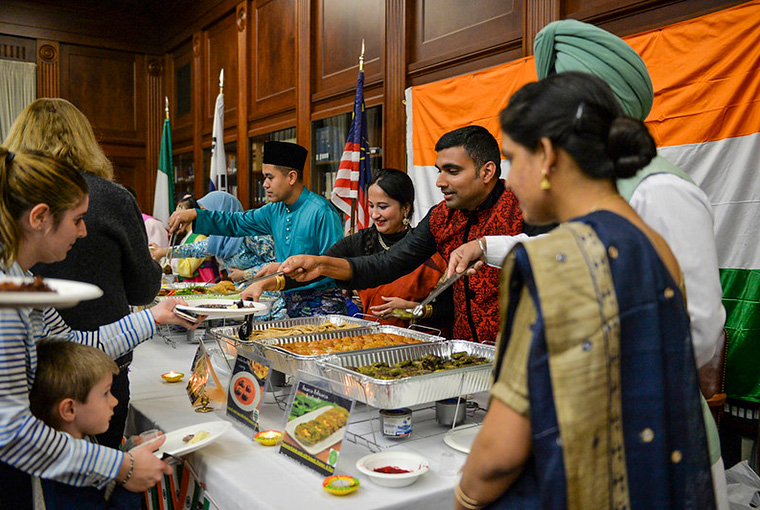A Break from Studying: Naval War College’s Int’l Cuisine Night Offers Flavors from Algeria to Vietnam

NEWPORT, R.I. -- Minced vegetable kabobs. Canapes of herring, roe and anchovies. Round, fluffy couscous.
If you are in western India during the festival of Diwali, or in Sweden in midsummer, or in Jerusalem on any given night, you might find food like the spread at the U.S. Naval War College’s International Cuisine Night on Jan. 24.
“I want to take people to a fresh Swedish summer,” said Maj. Christofer Lennings of the Swedish marines, standing behind a table of 800 seafood canapes made by him and wife Anna.
Next to him, Lt. Cmdr. Roi Sasson of the Israeli Navy presided over trays of pearl-shaped couscous. “I think this represents Israel,” Sasson said. “When we were young, this was the most popular.”
Cuisine Night is a tradition in Newport for the college’s visiting foreign military officers, who spend a year as graduate students alongside their American counterparts.
This year, 120 students from 76 nations are part of the Naval Command College or Naval Staff College.
They take turns presenting traditional cooking to their classmates in what’s become a light-hearted extracurricular event that offers a break from the serious study of Clausewitz and Thucydides.
It’s a festive night, held on a Friday or Saturday in the college’s Mahan Rotunda and Reading Room. These rooms – usually home to scholarly discussions of maritime strategy – come alive with children’s voices and the bright colors of national attire.
“This event is the result of some very hard work by officers and their families representing 18 nations, from Algeria to Vietnam, and crossing five continents,” Capt. Michael Marston, Naval Staff College director, told the assembled guests on Jan. 24. “Bon appetit!”
Hard work, indeed. Sweden’s Lennings and his wife, Anna, spent several days making the canapes that remind them of summertime in Sweden. They imported the anchovies from back home through a store outside Providence.
“Midsummer is an important holiday for us. This is a midsummer pole that we used to dance around,” the Swedish marine said, indicating a tiny replica decorated in blue and yellow Swedish flags.
Often the food preparation is a multifamily affair. At the India table, two Indian officers presided over a presentation of kabobs and curry, among other spicy vegetarian delicacies.
Lt. Cmdr. Swapnil Srivastava of the Indian Navy was joined by Commandant j.g. Samar Singh Sandhu of the Indian Coast Guard and his wife. Srivastava’s name was on the cuisine roster, but his friend and classmate from the Indian Naval Academy jumped in to help.
“As you know, Indian food is famous for spices. But we have tried to keep it down for our American counterparts, so they don’t start running away down the hall,” Srivastava said, laughing.
The theme was festive, and the table was decorated with tea lights to bring to mind Diwali, the Hindu festival of lights. Srivastava wore a kurta, a tunic that is traditional dress for Indian men at festivals and weddings.
Read more about the Naval War College's international student programs: Born from Lessons of WWII, Naval War College International Program Connects World’s Navies One Class at a Time.
Sandhu’s wife, Preeti, held a bowl of vermilion dye. She offered a dot of dye on a person’s forehead as a welcome and expression of honor to those who approached the table.
“Whenever we welcome guests, whenever we greet someone, we use this,” Srivastava said.
Another version of couscous came from Lt. Hamid Berahma of the Algerian Naval Forces.
Berahma is from the western deserts of Algeria, a nation three times larger than Texas. He chose couscous with vegetables and hard-boiled eggs as an example of his hometown cuisine, he said.
“We are a big country and very diverse culture. The culture in the east is different from the center and the south. So couscous is from the center and the west. I focused on my region,” Berahma explained, as his wife, Moufida, served up platefuls.
She had some help: In the solidarity of neighboring nations, the wives of international officers from Tunisia and Morocco arrived to assist with the meal.
U.S. culture had a representative, as well – one with homegrown heat.
Navy Lt. Cmdr. Adam Moffit and his wife, Mallory, puzzled over what cuisine is uniquely American. Based on her roots in Texas and his time in Nevada, they decided: BBQ.
So Adam Moffit spent days making four styles of barbecue sauce from scratch: Kansas City, North Carolina, South Carolina and Texas. They also smoked beef brisket and served up “cowboy caviar,” a dip made of corn and tomatoes.
For their own traditional attire, the Moffits wore cowboy hats. Adam sported a Texas-sized belt buckle.
The response from his international classmates? Yippee!
The oldest institution of its kind in the world, the U.S. Naval War College offers graduate education to military officers and national security professionals and is accredited to award the Master of Arts degree. The college serves roughly 600 in-residence graduate students and more than 1,000 distance-education students each year.
International Cuisine Night from November 23, 2019

